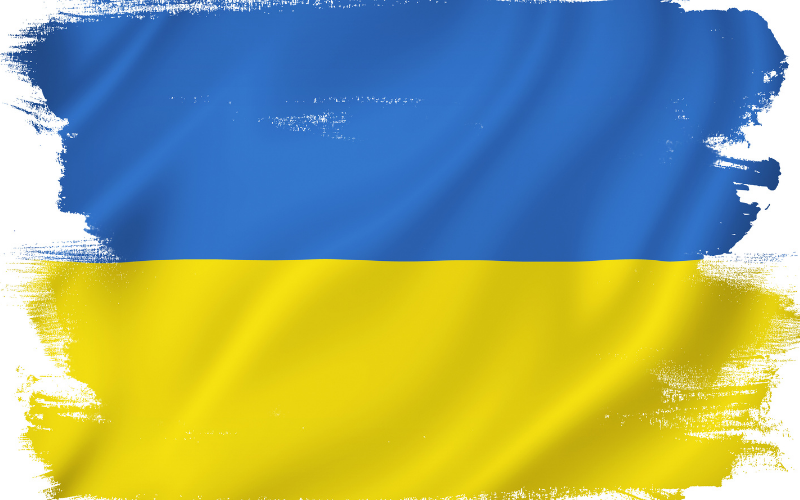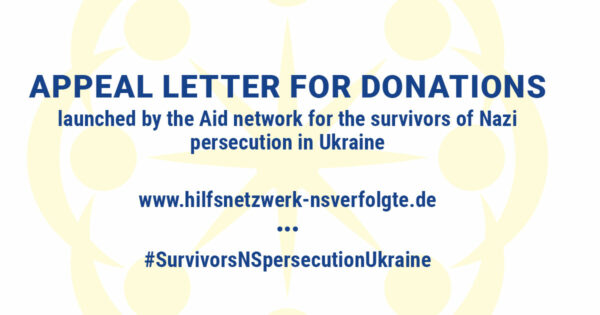Volodymyr Zelenskyy is fighting for respect, diversity, and democracy.

Many were moved by the speech that Ukrainian President Volodymyr Zelenskyy made during the night before Russia attacked Ukraine. He used plain words to defend freedom in his country and to fight for respect, diversity, and democracy.
Like many people all over the world at this time, we feel helpless and want to support the Ukrainian people. One option is to participate in our #everynamecounts project. We are building a digital monument to the victims of Nazism – they include hundreds of thousands of Ukrainians whose fates are documented in our archives.
Help us to preserve historical evidence in digital format and make it accessible to the world. On March 1, the Russian army bombed a television tower in the immediate vicinity of the Babi Yar Holocaust memorial. “For any normal person who knows our history, world history, Babi Yar is a special part of Kyiv,” commented Zelenskyy after the attack.
Preserving the culture of remembrance for Ukraine
Starting next week, we will be providing documents about Ukrainians who were persecuted by the Nazis for our #everynamecounts crowdsourcing project. We invite all our volunteers to index these documents as a way of upholding part of the culture of remembrance for Ukraine.
#everynamecounts is an initiative of the Arolsen Archives that aims to build a digital memorial to the victims of Nazi persecution. So future generations can remember their names and identities. But #everynamecounts is about society today, too – because by looking at the past, we can see where discrimination, racism, and antisemitism can take us.
The speech made by the Ukrainian President Volodymyr Zelenskyy on February 23, 2022 in Russian
"Today, I initiated a phone call with the president of the Russian Federation. The result was silence. Although there should really be silence in the Donbas. This is why I want to appeal today to all the citizens of Russia. Not as president. I am appealing to Russian citizens as a citizen of Ukraine. We are separated by more than 2,000 kilometers of a shared border. Today, your forces stand along that border, almost 200,000 soldiers and thousands of military units. Your leadership approved their step forward into the territory of another country. And this step could become the beginning of a large war on the European continent.
Today, the whole world talks about what could happen any day now. A reason could arise at any moment. Any provocation. Any spark. A spark, which could burn down everything. You are told that this flame will bring liberation to the people of Ukraine. But the Ukrainian people are free. We remember our past, and we are building our future ourselves. Building, not destroying, as you are told every day on the television. Ukraine in your news and Ukraine in real life are two completely different countries. And the main difference is that ours is real.
You are told that we are Nazis. But how can a people who gave more than eight million lives for the victory over Nazism support Nazism? How could I be a Nazi? Tell that to my grandfather, who went through the entire war in the infantry of the Soviet Army and died as a colonel in independent Ukraine.
You are told that we hate Russian culture. How is it possible to hate culture? Any culture? Neighbors always enrich one another culturally. However, this does not make them a single entity. This does not dissolve us in you. We are different. But this is not a reason to be enemies.
We want to define and build our history ourselves. Peacefully. Calmly. Honestly.
You are told that I will order an attack on the Donbas, to shoot and bomb without questions. Although there are questions, and very simple ones. Shoot at whom? Bomb what? Donetsk, where I have been dozens of times? Where I have seen people’s eyes and faces? Artyom street, where I walked with friends? Donbas Arena, where I rooted with the locals for our Ukrainian guys at the Euro Sherbakova Park, where we drank together when our guys lost? Luhansk? The home where my best friend’s mother lives? The place where my best friend’s father is buried?
Note that I am speaking right now in Russian, but no one in Russia knows what I am speaking about. These names, these streets, these last names, these events—this is all alien to you. Unfamiliar. This is our land. This is our history. What will you fight for? And with whom?
Many of you have been to Ukraine. Many of you have relatives in Ukraine. Some of you studied in Ukrainian universities, befriended Ukrainian people. You know our character. You know our people. You know our principles. You are aware of what we cherish. So please listen to yourselves. To the voice of reason. To common sense.
Hear us. The people of Ukraine want peace. The Ukrainian authorities want peace. We want it, and we make it. We do everything we can.
We are not alone. Many countries support Ukraine in this.
Why?
Because we are not talking about peace at any cost. We are talking about both peace and principles. About justice. About international law. About the right to self to self-determination, the right to determine your own future, every society’s right to security, and every person’s right to live without threats. This is all important for us. This is all important for the world. I know for certain that this is also important for you.
We know for certain: we don’t need war, neither cold, nor hot, nor hybrid. But if forces attack us, if someone tries to take away our country, our freedom, our lives, the lives of our children—we will defend ourselves. Not attack. Defend ourselves. While attacking, you will see our faces. Not our backs. Our faces.
War is a huge calamity, and this calamity carries a huge cost. In every meaning of this word. People lose money, reputation, quality of life. They lose freedom. But most importantly, people lose their loved ones. They lose themselves. In war, there is a lack of everything. That which there is an abundance of—pain, filth, blood and death. Thousands and tens of thousands of dead.
You are told that Ukraine could present a threat to Russia. This was not the case in the past, not now, and will not be the case in the future. You demand security guarantees from NATO. And we demand guarantees for our security, for the security of Ukraine—from you, from Russia, and from the other guarantors of the Budapest Memorandum.
Today, we find ourselves outside of any defensive alliances. The security of Ukraine is connected to the security of our neighbors. This is why, today, it is necessary to talk about the security of all of Europe. But our main goal is peace in Ukraine and the security of our citizens—Ukrainians. To achieve this, we are prepared to speak about this with everyone, including with you, in different formats and on any platforms.
War deprives everyone of guarantees. There will no longer be any security guarantees for anyone. Who will suffer the most from this? People. Who does not want this more than anyone? People. Who can prevent this? People.
Are these people present among you? I am sure there are. Public figures, journalists, musicians, actors, athletes, scientists, doctors, bloggers, stand-up comedians, Tik-Tokers and many more. Regular people. Regular, normal people. Men, women, the elderly, children, fathers, and most importantly, mothers. Just like people in Ukraine. Just like the authorities in Ukraine, no matter how much they try to convince you otherwise.
I know that they will not show this appeal of mine on Russian television. But the citizens of Russia must see it. They must know the truth. And the truth is that this needs to stop, before it is too late. And if the Russian leadership does not want to sit down at the table with us for the sake of peace, then perhaps, they will sit down at the table with you.
Do Russians want war? I would very much like to answer this question. But the answer depends only on you, the citizens of the Russian Federation.
Thank you for your attention.
We are pleased to draw attention to the Munich Public Library’s overview of reliable sources and fact checkers for the current situation in Ukraine.
Over the coming days, we will be looking at the fates of Ukrainian victims of Nazism, such as Nadezhda Alexeyeva and Ivan Beliy from Kherson, a city now already captured by Russia.
Please donate to help survivors of Nazi persecution in Ukraine
The Arolsen Archives have joined the “Aid network for the survivors of Nazi persecution in Ukraine”. The current war in Ukraine has left many people in great need. Among those suffering are also the survivors of National Socialist persecution. They need our help now more than ever to ensure that they have access to vital basics such as warmth, food and medical care. But the reconstruction of their homes after the war must also be supported.

With this aim in mind, the Aid network for the survivors of Nazi persecution in Ukraine was founded in March 2022 on the initiative of the non-profit association KONTAKTE-KOHTAKTbI. It consists of about 30 associations, foundations, places of remembrance and memorial sites in Germany whose work is about coming to terms with the crimes of the Nazi era. Some of them maintain long-standing contacts with survivors of Nazi persecution, specialist colleagues and cooperation partners in Ukraine. Participants of the network are, among others, the Central Welfare Board of Jews in Germany (ZWST), the Central Council of German Sinti and Roma and the EVZ (remembrance, responsibility and future) foundation.
Help the survivors of Nazi persecution in Ukraine with your donation!
Donations account: Berliner Volksbank
Recipient: Kontakte-Kontakty
IBAN: DE59 1009 0000 2888 9620 02
BIC: BEVODEBB

